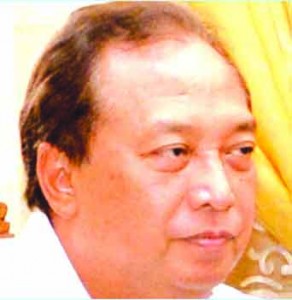
Governor Edgar Chatto, heeding criticisms, protests and objections from water consumers in the municipality of Panglao, has set a meeting with concerned stakeholders to thresh out serious misunderstanding hounding the water situation affecting five barangays.
The local government, desperately seeking a solution to the decades old water supply and distribution problem issue in the 10 barangays has managed to sow confusion over the entry of Abejo Waters Corporation and Balibago Waters to distribute water to more than 68,000 residents. However, the water supply used in the construction of the P7.2 Billion new Bohol Airport is not affected as the Bohol Water Utilities Inc. (BWUI) is supplying water from Corella town.
The choice of a private entity to own and manage the aging water system of the municipality has met stiff resistance from residents despite the presence of two  water distributors – the municipal waterworks, Balibago Waters and Abejo Waters.
Worst, according to residents, these two water companies plan to supply water were not subjected to competitive bidding and arrogantly disregarded the province policy of utilizing surface water as source of water supply to protect the endangered water tables of Panglao.
Abejo Waters entered into a memorandum of agreement with the LGU of Panglao on August 28, 2013 to develop, finance, design, engineer, test, commission, own, operate, manage and maintain, at its own cost, a water distribution system in Panglao.
The DILG also rebuked the SB for allowing Abejo Waters to develop the water system by tapping into the barangays fragile aquifers instead of bringing in water from outside sources.
As borne in the minutes of the August 26, 2015 SB session, Municipal Local Government Operations Officer Victor Lapiz chided the SB members “Just like sa Abejo, nagkapandol-pandol intawn mi didto to block Abejo kay mag dig sila sa duol sa atong reservoir”
Lapiz told the SP “My apprehension is that the race to pump water between Abejo and our own waterworks on the same water table will result in salt intrusion.”
Chatto, when asked by The Chronicle about the position of the provincial government over the water situation in Panglao during his weekly dialogue with the media said “We will look into the reported violations of the LGU together with the national agencies concerned and hear their justification even as we learned that a case has been filed before the Office of the Ombudsman”.
Chatto stressed that as a general policy statement, surface water source is better because of less environmental displacement which we are trying to develop.
“Ground water source has more environmental displacements leading to risks on the water tables”, said Chatto.
Chatto recognized the special needs of Panglao and Dauis since most developmental activities are centered on the island and any environmental impact with regards to the reported water diggings will affect the island.
But Chatto pointed out that the supply of water for the island of Panglao should be from surface water similar to Tagbilaran and not ground water.
Dauis is distributing water through a bulk water supply agreement with Bohol Water Utility Inc. (BWUI) and prohibits new business entities especially big housing projects from digging wells for their water requirements.
BWUI won the bid to supply the water requirements of the on going construction of the P7.2 billion New Bohol Airport with surface water from the town of Corella.
The Sangguniang Barangays (village councils) of Looc, Bolod, Danao, Lourdes, Bil-isan and Tawala and the Liga ng mga Barangay, Panglao Chapter vented their “strong objections” thru resolutions sent to the National Water Resources Board (NWRB) against the water permit application of Panglao Water Services, Inc.
Copies of the resolutions were also furnished to the Governor but due to time constraints meetings with those affected by the diggings were rescheduled.
The row between Abejo Waters and six barangays erupted after Panglao Water Services, Inc., majority owned by Abejo Waters started digging wells without the required permits from the National Water Resource Board (NWRB) and consultation with barangay residents.
Barangay residents resented the mode of supplying the water needs of the municipality through deep wells dug within the municipality raising fears of salt intrusion and the eventual drying up of existing wells.
The six barangays -Â Looc, Bolod, Danao, Lourdes, Bil-isan and Tawala and the Liga ng mga Barangay, Panglao Chapter vented their “strong objections” thru resolutions sent to the National Water Resources Board (NWRB) against the water permit application of Panglao Water Services, Inc.
Miffed by the sudden rush to drill by personnel identified with Panglao Water Resources, residents of Barangay Looc deplored the unauthorized activities despite the absence of an NWRB water permit and the approval of the barangay council.
The Chronicle learned that Looc Barangay Captain Reginaldo Guioguio complained to the Sangguniang Bayan of Panglao about the mysterious digging activities that reached the local DILG office.
The Barangay Looc resolution cited a Mines and Geoscience Bureau (MGB) survey warning the LGU of Panglao that with the presence of several sinkholes in the island, unregulated underground water extraction would lead to the sinking or subsidence of the land surface.
In Brgy. Danao, Kagawad Patricio Arcay expressed his concern thru an SB Resolution that with the Municipal Waterworks extracting underground water to supply several barangays, the added commercial extraction might cause the drying up of existing deep wells.
The SB Resolution adopted by Barangay Tawala and Bil-isan raised ugly fears of land subsidence where half of their barangay’s surface is composed of limestone and over extraction of ground water thru drilling is a common cause of “cover collapse or carbonate dissolution”.
Barangay Bolod stressed that they welcome the entry of water related business but “we don’t allow ground water extraction in our municipality”.
With the water supply issue of Panglao reaching the courts and the seeming disregard of the executive and the administration dominated Sangguniang  Bayan perceived to lean towards the water distributors schemes, the burgeoning population and business activities of Panglao is now in peril. (Chito M. Visarra)
